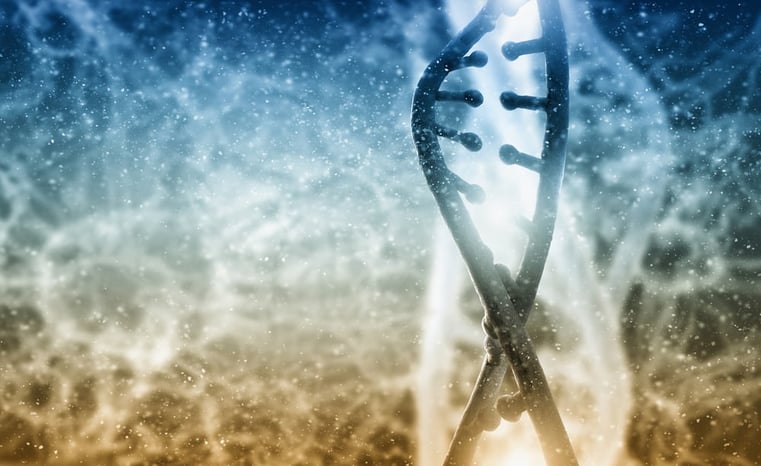
You hear the word cancer all of the time, but how does cancer actually happen? Cancer is a genetic disease that happens when changes occur in the genes of cells in the body. These abnormal cells then grow at faster than normal rates. Cancerous cells invade the body and destroy normal cells causing systems in the body not to work correctly or at all.
There are two types of these cancer causing genetic mutations:
- Hereditary
- Non-Hereditary
Non-Hereditary Gene Mutations
Most cancers are caused by what is known as an acquired gene mutation. This is a non-hereditary gene mutation that is caused by damage to genes in a cell. Damage to genes can occur in a variety of ways, including environmental factors such as UV rays from the sun as well as errors that occur when a cell copies itself.
Acquired gene mutations can only happen in somatic cells, also known as body cells. Body cells are any cell in the body with the exception of sperm and egg cells. Acquired gene mutations happen randomly and cannot be passed down to your children. It is also important to understand that non-hereditary gene mutations are not present in every cell in the body. These mutations are only in the area that the gene mutation happened.
Hereditary Gene Mutations
Hereditary gene mutations are also called germline mutations because this type of mutation occurs in either the sperm or egg cell (also known as germ cells) and passes directly from parent to child. Some cancers can be caused by a hereditary gene mutation, although they are less common than cancers caused by non-hereditary gene mutations. The National Cancer Institute reported that inherited gene mutations play a major role in about 5 to 10% of cancer diagnosis'.
Thanks to cancer genetic testing, you can be more informed now than ever about your risk for developing hereditary cancer based on gene mutations.
Genetic Mutations Happen in Different Ways
Gene mutations occur in the DNA or RNA (ribonucleic acid) of a cell. There are three different ways these mutations can occur:
1. Substitution Mutations
This type of mutation happens when a part of the DNA is substituted for another piece. The substitution changes the characteristics of the cell. For instance, let's say you are making a vanilla cake and it calls for milk. If you use water instead of milk, it will change the consistency, taste, and overall look of the cake, giving it different characteristics. Similarly, if a part of the cell's DNA is changed, the cell itself will act differently.
2. Insertion Mutations
Insertion mutations occur when an extra piece is added into the DNA. Let's go back to the cake example to show how this works. If you add cherries into your vanilla cake, you've changed the entire cake. It is now no longer a vanilla cake but a cherry cake. It is the same thing when you add in a piece of DNA that normally isn't there. It becomes an entirely different cell.
3. Deletion Mutations
Deletion mutations are the opposite of insertion mutations and occur when a base pair of DNA molecules is deleted from the base sequence. Let's once again revisit the cake example. Now let's say that your recipe calls for baking soda, which makes cakes rise, but you leave it out. You've removed an ingredient and now the cake will not rise. It is now an entirely different cake.
The bottom line is that all three types of mutations cause the cell to have different characteristics and behaviors than it would if the cell was normal.
What Do Gene Mutations Have to Do With Cancer?
Here's the thing, gene mutations are extremely common in the body. They happen all of the time. Some mutations are beneficial while others can cause harm over time. In most cases, the cell recognizes a mutation and either fixes it or the cell dies. However, there are times when the cell is not able to fix the mutation and it does not die either. This means the cell is able to copy itself. Each copy also has the same mutation.
A single mutation typically doesn't result in cancer. According to the American Cancer Society, it takes more than one mutation in a cell for cancer to occur. It actually takes many mutations during a person's lifetime to develop into cancer.
Cancer is most commonly associated with older individuals because the older a person is, the more gene mutations that have had time to occur in the body.
Individuals with a hereditary gene mutation are more likely to develop cancer at a younger age. The reason is that individuals without a mutation begin life with all healthy cells and it takes a longer amount of time for gene mutations to happen. However, individuals who are born with a hereditary mutation already have one gene mutation which makes it easier for more than one mutation to happen more quickly.
It is extremely important to understand that the presence of a gene mutation is not a guarantee that you will develop cancer. It just means you have an increased risk of developing cancer.
Hereditary Cancer Genetic Testing
Scientists, researchers, and medical professionals have been able to identify certain gene mutations that are linked to hereditary cancers. Genetic testing for cancer is constantly evolving. As of now there are genetic tests for:
- Breast Cancer
- Ovarian Cancer
- Prostate Cancer
- Endometrial Cancer
- Colon Cancer
- Kidney Cancer
- Melanoma
- Brain Tumors
- Thyroid Cancer
- Pancreatic Cancer
The bottom line is that certain hereditary gene mutations do put you at a higher risk of developing certain cancers. It also increases the risk that you pass on the mutation to your children. Compass Oncology offers cancer genetic testing for individuals who want to know if they have an inherited gene mutation that increases their likelihood of developing cancer or if there is a risk of passing a gene mutation down to their children.
Cancer genetic testing may be a good idea for you if you one or more of the following apply to you:
- You or a close relative have been diagnosed with cancer at a young age
- You or a close relative have had multiple cancers
- A particular cancer being present in multiple generations
Compass Oncology's Genetic Risk Evaluation and Testing (GREAT) program is made up of licensed physicians and nurses who are experts in cancer genetics and genetics counseling. Experienced specialists will be with you every step of the way. They will conduct a thorough family history evaluation and personal medical history evaluation to determine which panel will best suit your needs. Your results will be thoroughly discussed with you, along with guidance on early cancer detection and prevention. Being in the know allows you to make informed life decisions moving forward for you and your family.
Contact us if you believe cancer genetic testing is right for you!



